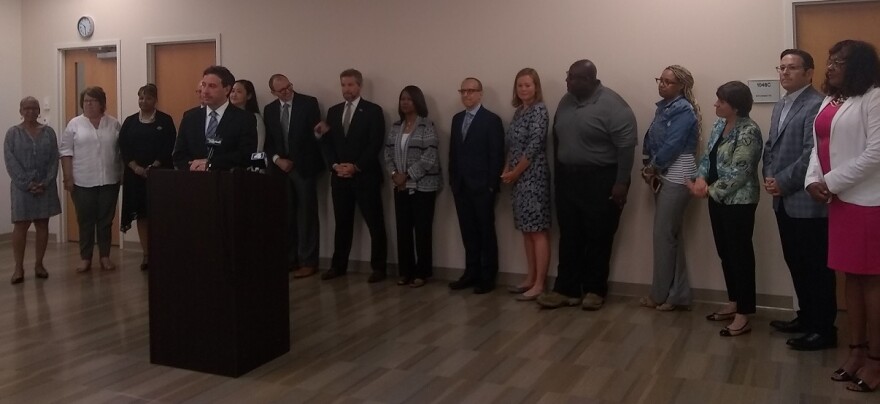Updated June 20 at 4:30 p.m. with additional comments from County Executive Steve Stenger and a local housing expert. - A key recommendation from the St. Louis Fair Housing Conference in April is prompting action in St. Louis County.
The county has assembled a task force to develop recommendations for promoting housing "equity, fairness and inclusion in our region," St. Louis County Executive Steve Stenger announced at a news conference Wednesday morning.
Stenger said it was time to create a task force to address low-income housing issues. He told reporters his administration has aimed to prioritize the issue since taking office in 2015.
“We can all say, ‘Oh why didn’t we do it earlier or why didn’t our community step forward and do this earlier, but, you know, I think we’re wasting time saying that. I think we just need to do it,” he said.
Stenger is a Democratic candidate seeking to retain his position as County Executive this election year. Housing advocates have been pushing for a county housing fund for years. Stenger said Beyond Housing chief executive Chris Krehmeyer has been a leading advocate for forming a trust fund, as have The Ferguson Commission Report and a report from For Sake of All issued in April.
Krehmeyer and St. Louis YWCA chief officer Adrian Bracy will lead the task force.
Related: St. Louis conference 'celebrates' 50 years of Fair Housing Act
The city of St. Louis already has such an affordable housing trust fund, administered by the Affordable Housing Commission.
Rising costs
The average sale price for a home in St. Louis County rose about 18 percent between 2013 and 2017. Even formerly affordable communities are seeing spikes, including Jennings, Normandy, St. John and Ferguson.
Among the greatest spikes in price in the county is Kirkwood. Between 2013 and 2017, the mean home sale price in Kirkwood rose from about $289,000 to about $382,000 — about 32 percent.
Loading...
Though residential development is happening in St. Louis County, much of the focus has been on single-family homes, condominiums and luxury apartments rather than low- or middle-income, multifamily rental units.

'Trapped generations'
The executive order specifically names African-American families twice in the body of the text.
“For over a century, African-Americans in St. Louis County have endured housing policies and development strategies that have trapped generations of some families in segregated and disinvested neighborhoods.”
And, “disinvestment in low-income and African-American neighborhoods has led to significant inequities in access to quality, affordable housing in areas of opportunity; employment and health care; strong schools; nutritious food and essential household goods; effective public transportation; and critical social networks.”
Task force meeting notes outlined its goal of defining who would benefit from the trust fund. It is unclear at this point where the money for the fund would come from or how much money would be allocated to those in need.
Stabilizing families, communities
Washington University housing expert Molly Metzger said local funds for housing assistance and resources would create more security for residents at a time when state and federal funds are at risk.
“Low-income people in St. Louis County move often and that’s really disruptive for kids’ education. It’s really disruptive for social relationships, for relationships with community; with political engagement,” Metzger said. “So we really need to be able to provide safe, decent, secure homes that can help stabilize our families and our community.”
The task force reports there are more than 150 similar funds around the country. The group plans to look at other models for the local initiative. The St. Louis Affordable Housing Trust Fund is about 15 years old. Advocates say they hope to see the city fund expanded over time.
More: Interested in housing issues around metro St. Louis? Check out the We Live Here podcast.
Ashley Lisenby is part of the public radio collaborative Sharing America, covering the intersection of race, identity and culture. This new initiative, funded by the Corporation for Public Broadcasting, includes reporters in Hartford, St. Louis, Kansas City, and Portland, Oregon. Follow Ashley on Twitter @aadlisenby.




